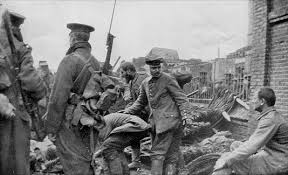‘This is Not War; It is the Ending of the World.’
Special to The Great War Project
(11-13 March) In France the battle for Neuve Chapelle lasts for three terrible days.
“It began well,” writes historian Michael Neiberg, “but soon degenerated into chaos that the Germans exploited. By the end, the British gained little for heavy losses.”
The British lose some 13,000 soldiers, Neiberg reports; the Germans 15,000 killed, wounded, missing, or taken prisoner.
At first the British take Neuve Chapelle, “but from there not much went well. They had too little artillery in reserve to solidify their gains.”
The Germans counter-attack, “and without enemy artillery to stop them, they quickly take back the town,” Neiberg writes.
On the third day of the battle (a century ago) the British repel a German attack, then launch their own counter-attack just after midday, writes historian Martin Gilbert. Two hours later facing heavy losses, the British cease their assault.
Then there is confusion between commanders and soldiers. Another British attack is cancelled, but some units do not receive orders.
According to the official history of the battle, “the confusion was heightened by the exhaustion of the men who, after three days and nights under fire, had fallen asleep and could only be aroused by the use of force – a process, Gilbert reports, “made very lengthy by the fact that the battlefield was covered with British and German dead, who in the dark, were indistinguishable from the sleepers.”
One British general concludes, “I am afraid that England will have to accustom herself to far greater losses than those of Neuve Chapelle before we finally crush the German Army.”
In a letter home written on the same day, the officer writes “People out here seem to think that the war is going to be quite short, why I don’t know. Personally I see nothing to prevent it going on forever.”
Colonial Indian troops stationed in this sector suffer the greatest losses. They will soon be withdrawn from the Western Front and sent to other battlefields.
Writes one Sikh soldier to his father soon after the battle for Neuve Chapelle ends, “We are as grain that is flung a second time into the oven, and life does not come out of it.”
Another Indian soldier writes “This is not war; it is the ending of the world.”
The lessons of Neuve Chapelle are unmistakable, if British and German commanders choose to look at the battle with clear eyes (not always the case).
At the beginning, writes war historian John Keegan, “the advantage lay with the attackers, as long as they could preserve a measure of secrecy, a diminishing possibility as the war prolonged and defenders learnt how greatly survival depended upon surveillance and alertness.”
But when the attackers approach the enemy’s position, they are most vulnerable and the advantage turns to the defenders.
The defenders know the ground that the attackers must cross; the attackers do not. The defenders also prepare fallback positions, and withdraw under protection of their artillery.
The farther the attackers advance, the more dangerous their circumstances become.
Although the fight for Neuve Chapelle was a relatively small battle, Keegan observes, “it was significant because it anticipated in miniature both the character and the course of a spring offensive” the British are preparing.


